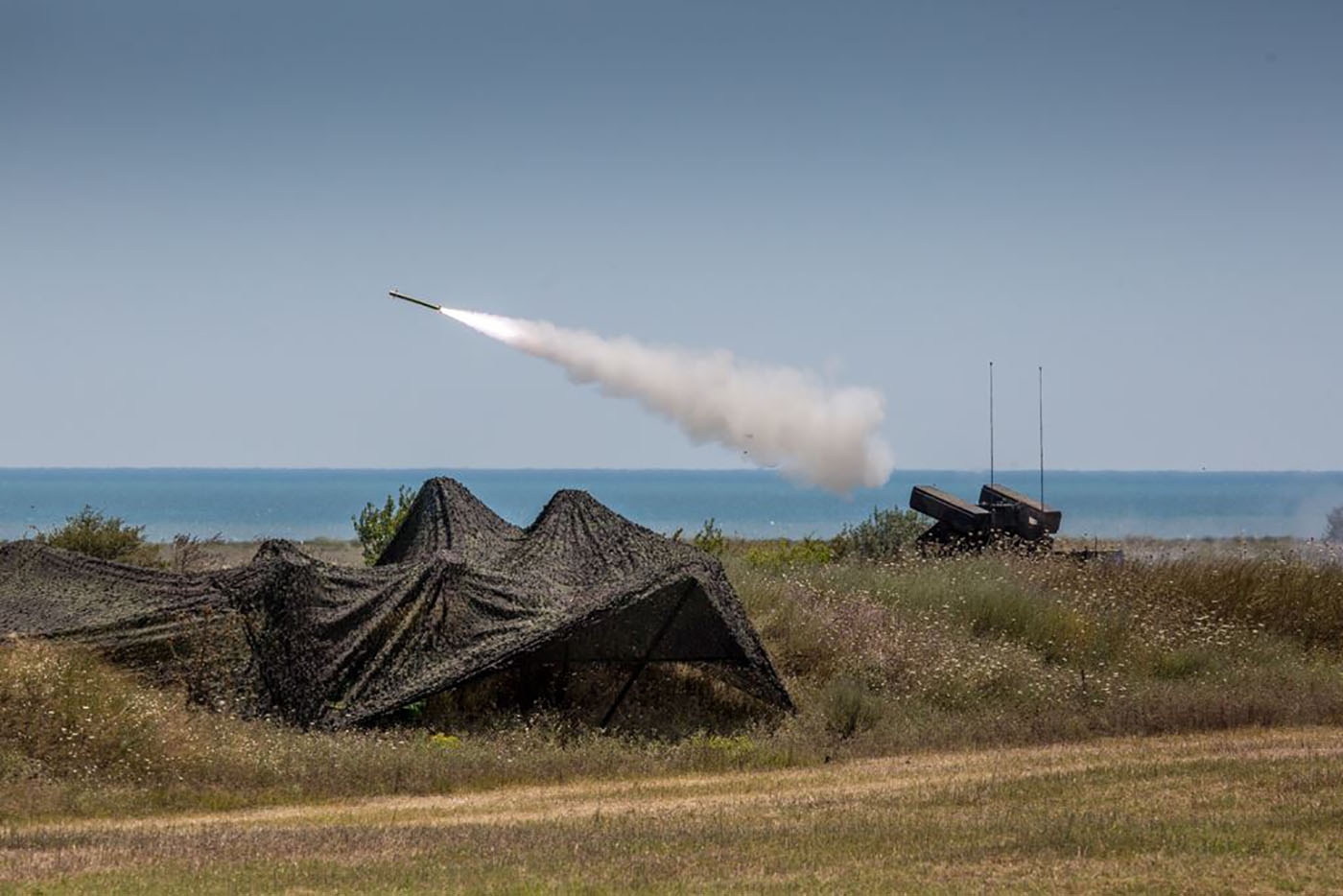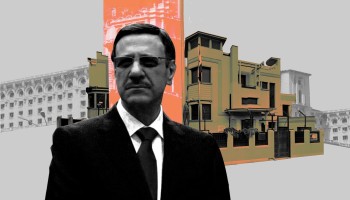Land belonging to a Romanian military base used by NATO for sensitive training exercises is actually owned by influential Syrian businessmen related or connected to dictator Bashar al-Assad, a close ally of the Russian government. The unlikely landlords got ahold of the land thanks to the local abuse of laws intended to restore property confiscated by Romania’s Communist regime in the 1940s and 1950s.
Romanian defense officials are fighting in court to regain control of the land near the country’s Black Sea coast. But in the meantime, even as NATO tries to deal with a civil war that has drawn Russian troops into Syria, it finds itself facing an ironic and unexpected connection to Syrians close to the hostile Assad regime -- one of whom has been under U.S. sanctions since 2008.
Capu Midia, the military base at issue, is in active use. Last July, some 1,000 NATO soldiers from 16 countries gathered there -- as well as at other locations in Eastern Europe -- for a major air-defense simulation. Just 30 kilometers from Constanta’s Mihail Kogalniceanu International Airport, which is used by NATO, Capu Midia is the only location in Romania where such exercises can be conducted. The area is so important that NATO has been using the base for exercises since the 1990s, even though Romania only joined the western military alliance in 2004.
Reporters for RISE Project, a partner of the Organized Crime and Corruption Reporting Project (OCCRP), and InfoSud-Est, an outlet based in Constanta, have uncovered records showing that a third of the restricted military area -- about 130 of its 422 hectares -- was bought up years ago by Horaizing SRL, a company controlled by Syrians close to Assad.
There is no indication of why the Syrians are interested in the land, and representatives of the company did not respond to requests for comment. In response to reporters’ questions, the Syrian Ambassador in Romania said that he knew nothing about the investments.
But thanks to unscrupulous local officials, an enterprising group of land buyers, and the unexpected involvement of a local prosecutor, land that was supposed to have remained with the state has now fallen into the hands of the influential foreigners. Romania has been struggling for decades to distribute land seized by its former Communist government to its rightful owners. The flare-up on the Black Sea coast shows how complicated that process can be -- and how unexpected the results.
The Syrian Buyers
Horaizing, originally a wood-processing firm called Landwood Company SRL, was set up in 1999 in Comanesti, a small town in eastern Romania known for its forestry industry. One of its co-founders was Haytham A. Asaad (no relation to the Syrian president), head of the Syrian Businesspeople’s Association in Romania. He retains a small amount of shares in the company to this day.
Paradise Papers
In early 2009 -- around the time that Horaizing started buying up the land -- Kaswarah Othman, the son of Syria’s ambassador to Romania, became the company’s largest shareholder. His shares were later taken over by Amira Mourei, the ambassador’s wife.
The connections to high-level Syrians don’t end there.
In 2014, the largest share of Horaizing was acquired by Delos Offshore SAL, a company registered in Lebanon the previous year. And according to the Paradise Papers leak, Delos is connected through several associates to Rami Makhlouf, a cousin of Syrian President Bashar al-Assad.
The Makhlouf Connection
The US Department of the Treasury said in 2008 that Makhlouf is a beneficiary of Syrian corruption who has manipulated the judicial system and intelligence officials to intimidate his business rivals. Because he is sanctioned, his assets have been frozen and Americans and Europeans are banned from doing business with him.
There is also an additional familial connection to the Romanian land. Makhlouf is the son-in-law of Walid Othman, the Syrian ambassador to Romania, whose wife and son have both held shares in Horaizing directly.
How the Land Sales Became Possible
The mechanism through which Romanian military land ended up in Syrian hands is a complex one.
The country’s so-called restitution laws -- intended to ensure that people whose land had been confiscated by the Communist regime got it back, or were fairly compensated -- has never worked entirely as planned. Though the Ceaușescu regime has been gone for nearly 30 years, tens of thousands of cases are still pending.
The laws exempted public land -- which includes military land -- mandating that those petitioning for it be compensated with different land elsewhere or with money.
But that’s not what happened in this case. In December 2004, the mayor’s office of Corbu, the seaside municipality near the base, realized that over 8,700 hectares of partly marshy land on its outskirts were unincorporated, so they registered the land as belonging to the town. About 422 hectares lay in the restricted military area.

In 2006, local officials began to divide this land into plots and issued property titles for those who could prove that their land had been confiscated. According to municipal documents examined by reporters, this was done even though the mayor’s office knew that the land belonged to the military and should not have been parceled out. According to the press office of the Ministry of National Defense, by issuing the property titles, the authorities in Corbu and Constanța were in violation of the restitution law.
But what’s done was done. This is where an enterprising group of local land-flippers got involved.
Meet the ‘Land Flippers’
The story involves two local men named Liviu Dorin Bamburic and Dragos Bostina.
After the Corbu land became available, the two started a land business with a simple plan.
First, Bostina was to identify the original owners of the land confiscated by the Communists. Then Bamburic would raise enough money to buy up their rights to the land at low prices. This was possible because many of the potential owners knew just how torturous these restitution cases could be -- in some cases, they could drag on for years. Instead of dealing with the authorities, why not sell right away to a local entrepreneur?
The rights now acquired, the last step in Bamburic and Bostina’s plan was to flip the properties and resell them for at least ten times the price. It worked like a charm, earning the two men millions of euros.
But things soon went south. The two partners had a dispute over the money that nearly turned deadly. In January 2008, while on the way to his girlfriend’s house, Bamburic was shot times by several men.
Bamburic is sure that Bostina is the one who commissioned the attack, and tried to prove this in court. He says he hadn’t spoken to his old partner since the previous year, and never did so again.
But over the following year, both men became land suppliers for the Syrians.
According to local land records, at least 20 sales, totaling about 80 hectares of restricted military land, were made to Horaizing by Bamburic, Bostina, and several of their friends in 2009 and 2010.
Bamburic explained to reporters that he had met Asaad, the company’s founder and shareholder, in the 1990s, when they were both in the lumber business. “When I met him, he was just a dealer,” he said. “I was selling him wood, and he was selling it further to the Arab countries. He had money.”
Bamburic told reporters he didn’t know that one of Horaizing’s shareholders at the time of the transactions was Othman, the ambassador’s son. But, he said, “I don’t think that the relatives of the Syrian Ambassador were involved in the business.”
As Bamburic saw it, the land he had sold to the Syrians was never the property of the army anyway -- in his view, it had already abandoned the base by the time of the sale.
Though Bostina and Bamburic were no longer partners, Bostina sold land to Horaizing, too. And he appears to have made good money doing it. For example, according to the land records, a local man named Constantiu Vasilescu received five hectares from the town hall in January 2009. One month later, he sold it to Bostina and one of his friends for almost €21,000. When they flipped it to the Syrians, they pocketed €250,000.
The Fugitive Lebanese
Horaizing is not the only controversial company that bought the restricted land. In 2008, a Romanian firm called Yourhotels SRL paid Bamburic €2.2 million for nine hectares (which he had just bought for almost €18,000 three months earlier).
The man behind Yourhotels, Hassan Awdi, is a fugitive Lebanese-American businessman convicted by Romanian authorities in 2014 on charges related to his acquisition of CFR Mesagerie, a state-owned railway delivery company. Awdi then looted the company by selling off its locomotives and wagons for scrap, according to local media reports.
The businessman left Romania in 2009 as legal pressure mounted.
Perhaps that’s why, after amassing at least 30 hectares in the restricted area, Awdi’s Yourhotels sold them to another Romanian company whose shareholding companies are registered in Cyprus and whose owners don’t appear in the paperwork.
“I was aware of the small military base that was there in the middle [of the land],” Awdi said, adding that he bought it with an eye to building a new resort with the help of foreign investors.
“Corbu was one of 13 projects in my hands when I left Romania because of the SRI [Romanian Intelligence Service] mafia. I was very good to Romania, but Romania does not deserve good people like me,” he said. “I have always respected the laws of Romania.”
Despite his apparent efforts to protect his new property from seizure by the authorities, Romanian prosecutors seized all of Awdi’s land, including from the restricted area, in 2011.
The Prosecutor and the Father-in-Law
The story only gets stranger. After the failed assassination attempt on Bamburic, an investigation against Bostina, his former partner, was opened and closed several times, and eventually dropped, by prosecutors in Constanta, the local county seat. A senior official in charge of that office was Chief Prosecutor Gigi-Valentin Stefan.
This would seem to be an unrelated, if sordid, matter. Except for one fact: In a matter of three months, while the case was still being investigated, a man named Ilie Albu -- who happens to be Stefan’s father-in-law -- managed to acquire 49 hectares of the restricted land, and then to sell it to Horaizing -- for a total of €932,900.
Curiously, the 74-year-old Albu is not from Corbu. He had initially applied for a property from his own village, nearly 100 kilometers away, but was turned down because none was available.
He then applied for the available land in Corbu, despite having no personal connection to the region.
The restitution law permits this kind of application for land in another location as a kind of compensation. But it is noteworthy that Albu managed to profit from the very same land-flipping scheme used by Bamburic and Bostina, even as his son-in-law was involved in an attempted murder case involving those very same people.
When contacted by reporters, Stefan, the prosecutor, said he didn’t want to discuss the details of his father-in-law’s land deal. He also said he had never investigated any other cases related to land returns in Corbu.
The Battle to Recover the Land
Starting in 2009, local Corbu officials began to pursue several legal strategies to try to secure a ruling that the land they had given out through the restitution law had, in fact, been theirs to give away.
That year, they filed a lawsuit against the Ministry of National Defense in an attempt to have the land declared as non-military land.
The ministry then went to court, filing its own suits against the Corbu authorities and the new landowners.
All these trials were still ongoing when, in 2011, the Corbu officials filed a separate suit, this time against the Romanian government, to try to have the military land removed from the state inventory of public property.
But last year, the High Court of Cassation and Justice -- the supreme court of Romania -- ruled against them, deciding that the land was, in fact, public. The local authorities have since filed several new cases to try to have the high court’s decision overturned.
The previous cases -- suspended while the 2011 suit was ongoing -- will now be reopened, though the high court’s ruling against the local authorities means they’re unlikely to prevail.
It is not known if the Syrian owners will be compensated. Returning all the land affected would involve dozens of contracts, so actually transferring the land back to the state would take some time.
Military officials at the Capu Midia base have asked the Constanta prosecutors to investigate the local authorities for abuse of power, but the prosecutors closed the case, citing statute of limitations.
This January, reporters met with Marian Galbinasu, Corbu’s mayor, to ask him about the land sales that occurred under his watch. But the mayor left reporters in his office without answering questions about the case and never returned. He refused any further contact or comment.
In response to reporters’ questions, the Ministry of National Defense described the Capu Midia base as “an objective of strategic and national importance,” saying that it is “the only base of the Ministry of National Defense where anti-air missiles are launched.”
The officials confirmed that multi-national exercises using live ammo are carried out by NATO members on the base and also confirmed that it was aware of the identity of the land’s new owners.
For its part, the Syrian Embassy in Bucharest said that Ambassador Othman was on vacation, and anyway, that he does not know anything about the military land. Reporters tried to contact Asaad but received no response.
Riad Kobaissi in Beirut, Lebanon and ARIJ contributed to this report.
This story was produced as part of the Global Anti-Corruption Consortium, a partnership between OCCRP and Transparency International. For more information, click here.








